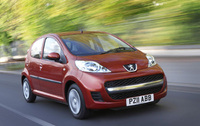Fuel-efficiency the antidote to budget uncertainty

With fuel duty at the pumps cut, but an increase in tax on oil production alongside a new fair fuel stabiliser, increased rates of Vehicle Excise Duty and planned increases on company car tax, the Budget continues to confound when it comes to balancing the cost of motoring.
Yet there is a simple and effective way to keep your motoring costs down says Jon Goodman, MD of Peugeot UK: “There will be many column inches dedicated to working out the best way to adapt to the new tax regime but you don’t need a tax accountant to help you decide how to save money on motoring. Simply choose the most fuel-efficient car for your needs. Fuel-efficiency determines a vehicle’s CO2 emissions, and hence the tax an owner or driver will pay, and it determines how much an owner or driver will pay at the fuel pumps, regardless of the advertised price of a litre.”
Peugeot’s message has been a clear one for a number of years: choose the most fuel-efficient vehicle you can for your driving needs, whether it be a small city run-around, a family ‘bus’ or a comfortable long distance workhorse. And Peugeot is supporting its message with a broad range of cars and light commercial vehicles that widely meet varying needs while all delivering exceptional fuel-efficiency.
The diminutive and fun four-seater Peugeot 107 city car, with its economical Euro 5 three-cylinder petrol engine, emits just 103 g/km of CO2 runs and for 62 miles per gallon in combined driving.
Choose the ‘Economique’ model from the stylish and hugely popular Peugeot 207 supermini range and you can escape VED completely with CO2 emissions of 99 g/km, while its 1.6 HDi 90 FAP diesel engine can stretch a gallon of fuel for 74 miles on the Combined Drive Cycle.
The new 308 range will introduce the latest in fuel-efficient technology later this spring, with a micro-hybrid e-HDi Stop & Start System. Combined with Peugeot’s highly efficient 1.6 litre HDi FAP 112 diesel engine, this helps reduce the 308’s CO2 emissions to just 98 g/km, for a zero rate of VED.
The multi-award winning Peugeot 3008 Crossover offers levels of class and comfort for 5 passengers that rivals can’t match, but this large, modern car can do all this with emissions of just 129 g/km of CO2 and over 57 mpg for the combined cycle from its HDi 112 diesel engine.
The Peugeot 3008 HYbrid4 - the world’s first diesel hybrid car - launches this autumn, and will drive down family motoring costs even further. Combining an HDi 163 diesel engine driving the front wheels and a 37bhp electric motor at the rear, this car can provide up to 200 bhp; four-wheel drive, Sport, Auto or ZEV (Zero Emissions Vehicle) modes with 74 mpg and CO2 emissions from 99 g/km.
For those needing even greater carrying capacity, the Peugeot 5008 Compact MPV seven seater can return combined fuel economy of 55 mpg and 135 g/km of CO2 from the 1.6 HDi 110 FAP EGC drivetrain in its Active model.
And if a large, elegant and luxurious saloon is the car for you, the new Peugeot 508, which goes on sale next month, also features the e-HDi Stop & Start System coupled to Peugeot’s 1.6 HDi 112 engine andsix-speed electronically controlled manual gearbox (EGC). This set-up delivers a combined fuel consumption of 64.2 mpg and a remarkable 109 g/km of CO2 from the saloon version, while the capacious SW manages 62.8 mpg with CO2 emissions of 110 g/km.
Not content with providing a range of exceptionally fuel-efficient cars to beat the budget blues, Peugeot is doing its bit to simplify ownership with its unique Just Add Fuel™ personal finance package, which includes three years’ fully comprehensive insurance, three years’ warranty, three years’ servicing and three years’ roadside assistance, all for a single fixed monthly payment. All owners need do is add fuel, whatever it may cost come April.
For those needing to move cargo rather than passengers, the Peugeot van range offers equally impressive fuel-efficiency. The Peugeot Bipper has a new 1.3 litre HDi 75 diesel engine with Stop & Start System technology, which gives it an unladen emissions figure of just 109 g/km CO2 and fuel economy of up to 68.2 mpg, with an EGC gearbox. The Peugeot 207 van has unladen emissions figures of just 110 g/km CO2 from its HDi 70 FAP engine.
The larger Partner, with its HDi 90 FAP diesel engine will also feature Stop & Start from April, with CO2 emissions of 129 g/km, reducing to 124 g/km CO2 later in the Summer with the addition of an electronically controlled manual gearbox.
As well as employing a combination of Stop & Start System technology and EGC gearboxes to optimise fuel efficiency, reduce noise and emissions, Peugeot has many Euro V engines right across the range, helping reduce running costs and bringing even its largest Expert and Boxer vans right up to date with regards to tailpipe emissions.

